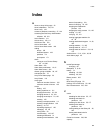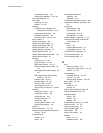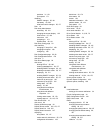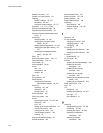Glossary
225
Parallel Transmission The transfer of data characters using parallel electrical paths for each bit of the
character, for example, 8 paths for 8-bit characters. Data is stored in computers in parallel form, but may
be converted to serial form for certain operations. See Serial Transmission.
partition A partition is a logical subdivision of an array to which you can assign a LUN. You can add,
expand, rename, change the LUN, and delete partitions using the RAID controller’s software. This type
of partition is not the same as a partition you create with your operating system or third party tools.
point to point A point-to-point connection is a dedicated communication link between two devices as
an alternative to FC-AL. Rorke Data uses this term to refer to a link between the controller or router (N-
port) and the F-port on a switch. Rorke Data supports point-to-point connections to fabric ports only
(sometime referred to as F-ports).
Power Cord
Throughout this Galaxy 65 user guide this term is used in accordance with the preferred
US context of: “an insulated flexible electric wire fitted with connectors at each end and used for the
transmission of electrical power to computer equipment.
Power Supply/Cooling module One module in the Galaxy 65 Subsystem family of RAID products.
Power Supply/Cooling modules contain the power supply and two cooling fans.
Protocol
A system of rules and procedures governing communications between two or more devices.
Protocols vary, but communicating devices must follow the same protocol in order to exchange data. The
format of the data, readiness to receive or send, error detection and error correction are some of the
operations that may be defined in protocols.
Redundant Not essential.
router A router is a device that enables connectivity between SCSI devices and FC networks. It routes
each data command to the appropriate SCSI channel based on the address it is intended for.
SAM (Storage Array Manager): For the Galaxy 65 Subsystem family of RAID products, provides a
browser-based interface for configuring, managing, and monitoring the Galaxy 65 Subsystem. In both the
user interface and the documentation, it is often referred to as SAM.
SCSI adapter A SCSI adapter is a 16-bit fast/wide or 8-bit narrow, single-ended or differential physical
connection between a router and SCSI devices. Each SCSI adapter supports up to 16 (fast/wide) or 8
(narrow) SCSI devices, including itself.
SCSI addressing Each device supported by a SCSI adapter has its own unique SCSI address, which
dictates the device’s priority when arbitrating for access to the SCSI bus. A SCSI address of 7 has the
highest priority. For a fast/wide SCSI adapter that supports up to 16 devices, the next highest priority
address is 6, then 5, 4, 3, 2, 1, 0, 15, 14, 13, 12, 11, 10, 9, and 8. A narrow SCSI adapter supports up to
eight devices, including itself. The SCSI address 7 has the highest priority, followed by 6, 5, 4, 3, 2, 1,
and 0.
SCSI bus
A SCSI bus provides a means of transferring data between SCSI devices. A SCSI bus is
either an 8- or 16-bit bus that supports up to 8 or 16 devices, including itself. The bus can consist of any
mix of initiators and targets, with the requirement that at least one initiator and one target must be present.
SCSI device
A SCSI device is a single unit on a SCSI bus that originates or services SCSI commands.
A SCSI device is identified by a unique SCSI address. SCSI devices can act as initiators or targets.


















